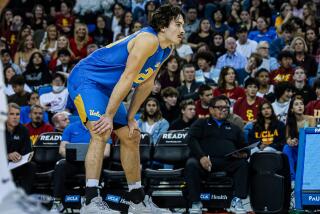Los Angeles Tennis Tournament : Krickstein Holds On, Joins Chang in Final
- Share via
Brad Gilbert met his match point Saturday night. Actually, he met seven of them, which was how many times he was a single shot away from beating Aaron Krickstein.
And seven times Krickstein got away.
This is the surest way to deflate the slow pace of Brad Ball, in seven quick steps.
“I came unraveled,” Gilbert said.
How close was it?
“I was one point away, one shot away, one miss away from losing,” Krickstein said.
Breathe deeply and count: One. Two. Three. Four. Five. Six. Seven.
Gilbert wasted a touchdown and conversion worth of match points and lost to Krickstein, 1-6, 7-6 (7-0), 6-2, Saturday night in a semifinal match of the $425,000 Volvo/Los Angeles tournament at UCLA.
If Krickstein was not quite out of the tournament, he at least had one sneaker out the door.
But he said he never thought, on any of those match points, he would lose.
“No, never, honestly,” Krickstein said. “As weird as that may sound.”
In the final today, Krickstein will play Michael Chang, a 6-4, 6-4 winner over Scott Davis in the other semifinal.
Down 1-6, 2-5, Krickstein saved four match points at 3-5 and eventually broke Gilbert, who was serving for the match.
That done, Krickstein immediately fell to 0-40 and faced three more match points, amazingly saving them all to hold serve.
Now tied, 5-5, Gilbert lost his serve at 15 as well as his temper.
Gilbert cracked his racket down on the stick supporting the net and received a code violation for unsportsmanlike conduct from chair umpire Gerry Armstrong.
But at 6-5 and serving for the set, Krickstein couldn’t hold his serve either. Gilbert forced a tiebreaker with an overhead winner that punctuated a 34-shot rally on break point.
Krickstein played a perfect tiebreaker, the first and last points crosscourt forehand winners, then cruised past a seemingly shell-shocked Gilbert in an easy third set.
Gilbert, who double-faulted on one match point and committed errors on three others, would not say that he choked.
“It’s an Adam’s apple,” Gilbert said. “But it was more of a gift than anything else.”
Gilbert was asked if he had ever lost after holding seven match points.
“Not that I hope to remember,” he said.
Davis thought he knew just what to expect from Chang.
“He’s always going to pass well, he’s always going to run well,” Davis said.
But . . .
“His serve,” Davis said. “He kept me on the defensive much more than I thought he could.”
While Davis earned $16,785, and increased his career earnings to $1.06 million, Chang advanced to his second final this year.
The other was that old clay court tournament in Paris. Chang, who beat Stefan Edberg in the French Open final in June, is undefeated so far in finals--he beat Johan Kriek in San Francisco last year.
Chang traced his success to an unlikely source--his serve.
“I think I served exceptionally well today for some reason,” Chang said.
Actually, Chang’s serve has been a major surprise the entire tournament. Going into the Davis match, Chang had lost his serve only twice in three matches, both times to Pete Sampras in the first set of their Tuesday night match.
For a guy who had no aces and one service winner, Chang did indeed outperform the more established serve-and-volley game of Davis.
“I think he’s serving better than than he has all summer,” Davis said. “And in this tournament, he’s done it against serve-and-volley players like Sampras, (Darren) Cahill and myself, who put a lot of pressure on serves.”
Chang lost only six points on his serve in the first set and wriggled away from his most serious threat when he was down, 0-40, in the sixth game.
Facing three break points for 2-4, Chang got one back quickly when Davis topped a slow-hit second serve into the net.
“I actually missed it because he hit it so soft,” Davis said.
Apparently that was the idea. Chang saved the next with his first and last service winner. Now Chang’s strategy changed.
“Now, it’s 30-40, which is only one break point, and knowing that made it easier,” Chang said.
He got to deuce when the net caught a Davis backhand, and eventually won the point with a forehand passing shot down the line. Chang’s only moment of worry had passed.
“That was a crucial part,” Chang said.
Davis’ serve was broken the next game, this time with a laser-beam backhand pass down the line on break point for 4-3.
After that, Davis had no more opportunities. Broken twice more in the second set as Chang took a 5-2 lead, Davis got one back for 5-4, but Chang served out the match.
Davis knew his best chance had come and gone long before then.
“Once he got out of that 0-40 game in the first set, I think he felt a lot more confident,” Davis said.
Too many mistakes (46 unforced errors), too much Chang, these were the problems with which Davis could not cope.
Why the errors? Davis may have violated the most primary rule of sports.
“I just maybe tried too hard or took my eye off the ball,” he said.
More to Read
Go beyond the scoreboard
Get the latest on L.A.'s teams in the daily Sports Report newsletter.
You may occasionally receive promotional content from the Los Angeles Times.










